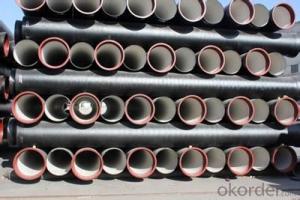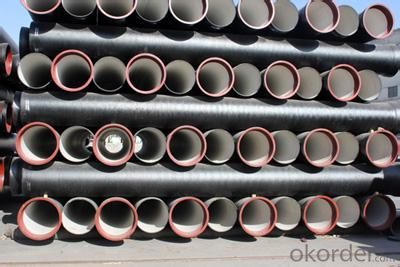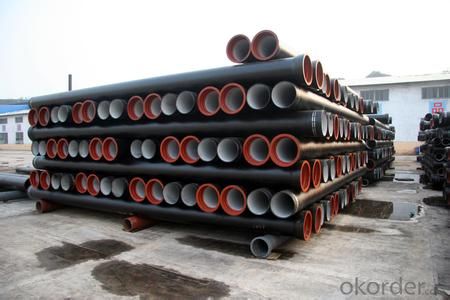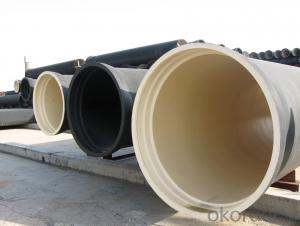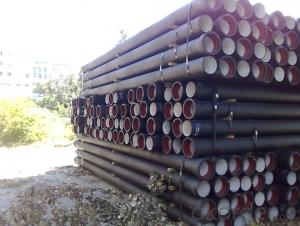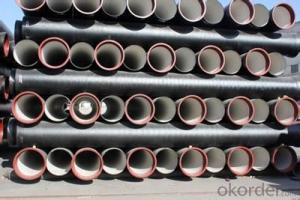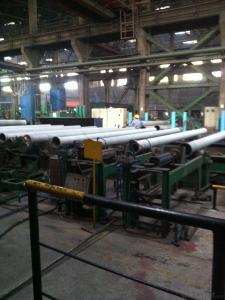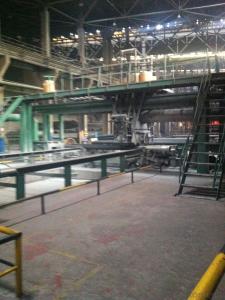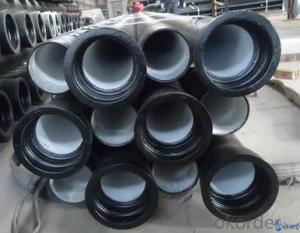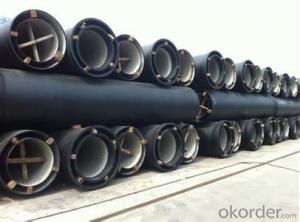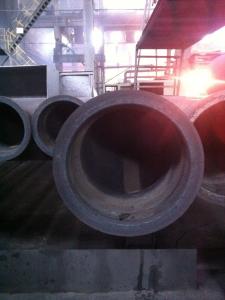DUCTILE IRON PIPES AND PIPE FITTINGS k9 CLASS DN80
- Loading Port:
- Tianjin
- Payment Terms:
- TT OR LC
- Min Order Qty:
- 22 pc
- Supply Capability:
- 3000 pc/month
OKorder Service Pledge
OKorder Financial Service
You Might Also Like
Material : Ductile Cast Iron
Size Range : DN 80mm to DN 2000mm
Unit Effective Length : 6m or 5.7m
Manufacture Standard: ISO 2531:1998/ EN 545:2006/EN 598:2007
Annual capacity : 200,000 tons
Coating Exterior: Zinc 130g/m2 according to ISO 8179-1 and bitumen coating 70 microns.
Cement Interior: Portland Cement/ High Alumina Cement/ Sulphate Resisting Cement Lining according to ISO 4179
Special requirements on external coating and internal lining can be applied
We also provide accessories such as SBR/EPDM rubber gaskets, lubricant paste, pipe caps, PE sleeves, etc.
Additional Parts:
Each pipe is strictly inspected according to related standard to ensure permanently high performance.
Easy Installation at site and service free for life
Long Service Lifespan
Quotation will arrive you within 24hours once we get your inquiry.
We guarantee offering you a competitive price.
A copy of original inspection reports of pipes will be offered after shipment.
Photos of loading process will be sent to the customer after shipment effect.
We will follow-up the delivery progress after shipment effect and update to the customer on weekly basis.
- Q: Do ductile iron pipes require internal lining for potable water applications?
- Yes, ductile iron pipes do require internal lining for potable water applications. This is because the iron used in these pipes can react with the water and potentially contaminate it. Internal lining acts as a barrier between the water and the iron, preventing any chemical reactions and ensuring the water remains safe for consumption.
- Q: How do ductile iron pipes perform in acidic soil conditions?
- Ductile iron pipes are known for their durability and resistance to various environmental conditions, including acidic soil conditions. When exposed to acidic soil, ductile iron pipes demonstrate excellent corrosion resistance due to their unique composition and protective coating. The high carbon content in ductile iron pipes provides them with inherent resistance to corrosion, even in acidic environments. Additionally, the pipes are typically lined with cement mortar or a suitable epoxy coating, which acts as an additional layer of protection against acid attack. The combination of the high carbon content and protective coating creates a barrier that prevents the acid from directly contacting the iron, thus minimizing the risk of corrosion. This ensures that the pipes remain structurally sound and maintain their integrity over an extended period of time. Furthermore, ductile iron pipes have a long service life and are designed to withstand a wide range of soil conditions. Their inherent strength and flexibility enable them to endure the stresses and strains caused by the surrounding soil, including acidic soil environments. This makes them an ideal choice for applications where the soil has a higher acidity level. It is important to note that while ductile iron pipes perform well in acidic soil conditions, the severity and concentration of the acid can impact their performance. In extremely aggressive or highly concentrated acidic environments, additional corrosion protection measures may be necessary, such as the use of sacrificial anodes or cathodic protection systems. In conclusion, ductile iron pipes are highly resilient and perform exceptionally well in acidic soil conditions. Their corrosion resistance, combined with their robust structure and protective coating, ensures their longevity and reliability, making them a preferred choice for various applications in such environments.
- Q: Are ductile iron pipes resistant to alkali attacks?
- Ductile cast iron, commonly used in ductile iron pipes, has demonstrated its remarkable resistance to alkali attacks. This is achieved through the inclusion of specific chemical compositions that provide exceptional corrosion resistance. Alkali attacks, which arise from the interaction between alkaline substances and metals or other materials, are effectively countered by the dense and protective oxide film present on both the inner and outer surfaces of ductile iron pipes. This oxide film forms naturally over time and possesses a composition and structure that offer excellent resistance to alkali attacks. Moreover, to further enhance their ability to withstand corrosion and chemical reactions, ductile iron pipes are frequently coated with various protective layers, such as epoxy or zinc. It should be emphasized that although ductile iron pipes exhibit a high resistance to alkali attacks, the severity and concentration of the alkali substances can still impact their overall performance. In extreme instances, where there are exceedingly high concentrations of alkali substances or prolonged exposure to aggressive alkaline environments, some damage may occur to the protective layers of the pipes. Nonetheless, within normal conditions and acceptable parameters, ductile iron pipes are widely regarded as possessing outstanding resistance to alkali attacks.
- Q: Are ductile iron pipes suitable for gravity sewer systems?
- Yes, ductile iron pipes are suitable for gravity sewer systems. Ductile iron pipes have high strength, durability, and flexibility, making them an excellent choice for underground sewer networks. They can withstand the pressure and weight of the soil above them, making them ideal for gravity flow systems where wastewater flows naturally due to gravity. Additionally, ductile iron pipes have a long lifespan and are resistant to corrosion, making them a reliable and cost-effective solution for gravity sewer systems.
- Q: Do ductile iron pipes require internal linings for potable water?
- No, ductile iron pipes do not require internal linings for potable water. Ductile iron is a type of iron that has been treated to enhance its strength and flexibility. It is commonly used for water distribution systems due to its durability and resistance to corrosion. Unlike other materials, such as cast iron or steel, ductile iron pipes have a protective layer called a cement-mortar lining, which provides an effective barrier against corrosion and prevents the leaching of any harmful substances into the water. This lining is applied during the manufacturing process and is designed to withstand the corrosive properties of potable water, making internal linings unnecessary. Additionally, the smooth surface of ductile iron pipes helps to maintain the quality and flow of water without the need for additional linings.
- Q: How do ductile iron pipes perform in high-altitude areas?
- Due to their inherent strength and durability, ductile iron pipes are highly effective in high-altitude regions. The exceptional properties of ductile iron, such as its high tensile strength and impact resistance, make it ideal for withstanding the challenges presented by high-altitude environments. One significant advantage of ductile iron pipes is their ability to endure both internal and external pressures. In areas with varying water pressure, these pipes can withstand such fluctuations without compromising their structural integrity. This guarantees a consistent and uninterrupted flow of water, eliminating the risk of pipe failures or leaks. Furthermore, ductile iron pipes possess excellent resistance against corrosion, which is crucial in high-altitude areas with unpredictable and harsh atmospheric conditions. The protective lining and external coatings of these pipes provide an additional layer of defense, ensuring their durability and reducing the need for frequent maintenance or replacements. Additionally, ductile iron pipes have a higher tolerance for temperature variations compared to other materials. In high-altitude regions where temperature fluctuations can be extreme, these pipes can withstand expansion and contraction without cracking or rupturing. This thermal stability is vital for maintaining the integrity of the pipeline system and preventing costly repairs. To summarize, ductile iron pipes are an ideal choice for high-altitude areas due to their strength, durability, resistance to pressure variations, corrosion resistance, and thermal stability. These properties make them a reliable option for water distribution systems in such environments, ensuring a continuous water supply without compromising safety or efficiency.
- Q: What is the relationship between the mechanical properties of spheroidal graphite cast iron and its spheroidization rate?
- Poor balling and poor performance. Can do under tensile. General level three or four or more on it
- Q: What is the typical wall thickness of ductile iron pipes?
- The wall thickness of ductile iron pipes can vary depending on their size and intended use, with a typical range of 0.25 inches (6.35 mm) to 0.5 inches (12.7 mm). However, when dealing with larger diameter pipes or those meant for high-pressure applications, the wall thickness may exceed these measurements. To determine the suitable wall thickness for a ductile iron pipe, it is crucial to refer to industry standards and project specifications.
- Q: Can ductile iron pipe be used for oil and gas transmission pipelines?
- Yes, ductile iron pipe can be used for oil and gas transmission pipelines. It offers excellent strength, durability, and corrosion resistance, making it suitable for the transportation of various fluids, including oil and gas. However, other factors such as specific project requirements, operating conditions, and regulatory standards should also be considered before making a final decision.
- Q: How are ductile iron pipes protected against stray electrical currents?
- Ductile iron pipes, which are commonly used for water and sewer systems, are protected against stray electrical currents through a process known as cathodic protection. This method involves applying a low-voltage direct current (DC) to the pipes, which creates a protective electrical field around them. Cathodic protection is achieved by installing sacrificial anodes or impressed current systems near the ductile iron pipes. Sacrificial anodes, typically made of a more electrically active metal such as zinc or magnesium, are connected to the pipes and serve as the source of electrical current. These anodes corrode over time, sacrificing themselves to protect the pipes from corrosion due to stray electrical currents. Impressed current systems, on the other hand, utilize an external power source to supply the protective electrical current. Rectifiers are used to convert alternating current (AC) to direct current (DC) and the DC is then applied to the pipes through anodes. This method allows for more control over the amount of current being applied, ensuring optimal protection. In both cases, the electrical current flowing through the sacrificial anodes or impressed current systems creates a protective barrier around the ductile iron pipes. This barrier prevents the stray electrical currents from flowing through the pipes, reducing the risk of corrosion and extending the lifespan of the infrastructure. Regular monitoring and maintenance of the cathodic protection system are essential to ensure its effectiveness. This involves inspecting the anodes, checking the electrical current levels, and making any necessary adjustments or replacements to maintain the desired level of protection. Overall, cathodic protection is a reliable and widely used method to protect ductile iron pipes against stray electrical currents, safeguarding the integrity and longevity of water and sewer systems.
Send your message to us
DUCTILE IRON PIPES AND PIPE FITTINGS k9 CLASS DN80
- Loading Port:
- Tianjin
- Payment Terms:
- TT OR LC
- Min Order Qty:
- 22 pc
- Supply Capability:
- 3000 pc/month
OKorder Service Pledge
OKorder Financial Service
Similar products
Hot products
Hot Searches
Related keywords
